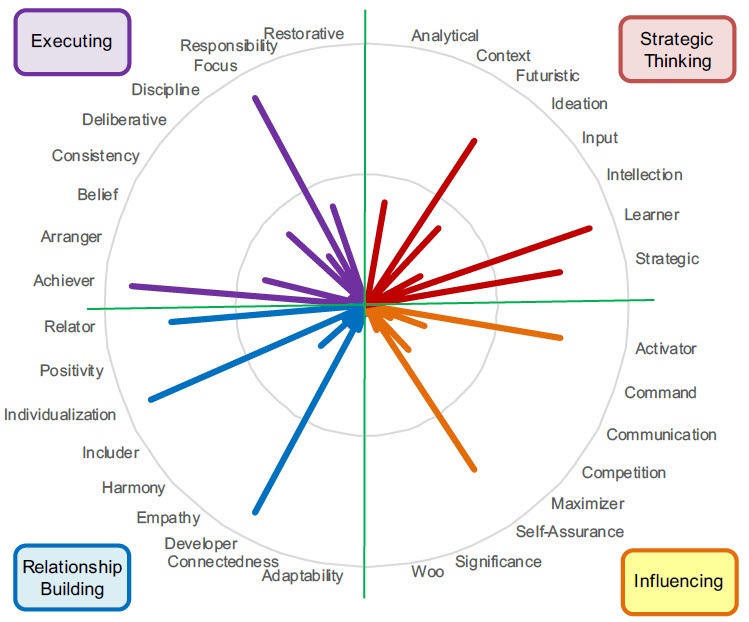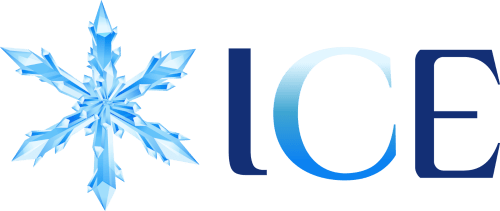As a coach we know that all of our clients are unique and they have so much more potential to tap into and create a more fulfilling life. We also have the opportunity to take our coaching business to the next level by focusing on the unique way we market, connect with the prospects, close the coaching agreements and coach them through their coaching program.
The strengths-based development is all about tapping into that potential and developing ourselves. It is a three-step process of self-awareness, self- expression and self-regulation.
It boils down to how we manage ourselves or how we manage our talents to successfully move towards our desired goals.
Talents are those innate and recurring thoughts, feelings and behaviours we can apply productively towards a desired outcome.
You can take a strength assessment which accelerates the self-awareness part of the three-step model mentioned earlier. Once you complete the assessment on-line, you will receive a report that highlights your top significant talents.

example, one of these categories of talents is called “Learner” which means that you have a great desire to learn and want to continuously improve. The process of learning, rather than the outcome, most excites you.
If you have not done the assessment yet, you can use the information you know about yourself, those characteristics that have resulted in many of your successes to date. Here is the process for you to start learning and applying immediately:
The I-C-E three step talent builder model can be used to manage your talent towards a desired goal:
- I – Identifying the edge your talent possesses and also how the talent can get in your way.
- C – Capture and cognizance of how the talent expresses itself in your daily thoughts, feelings and behaviors
- E – Executing a strengths-based approach by being intentional in your application of the talent
1. Identifying the Edge and Challenges of your significant talents
All Talent themes have elements that support you to be productive at reaching your desired goals and they also possess elements that can lead to challenges on your path towards your desired outcome!
For example, the Learner talent theme gives you a deep satisfaction in putting the time and effort into learning a new skill, concept or methodology which makes you valuable resource for the team. However, without proper focus, this can make learning, while enjoyable, irrelevant to the task at hand.
This is the self-awareness stage – it is the step designed for identifying and understanding the power and downside of the significant talent you possess.

2. Capturing and owning how the talent plays out in what you think, feel and do
We often forget and underestimate our talents. Coaches can assist clients in capturing and owning the expression of the talent by helping them explore instances in the past when this talent was particularly useful. This is the self-expression stage.
For instance, to facilitate this exploration, coaches can ask the following questions for the learner talent theme:
- What has been your greatest success — either at work or in your personal life? How did your Learner theme contribute to that success?
- With whom do you enjoy discussing ideas? What have you learned from these conversations?
- What are you learning about at the moment? What most excites you about it?
- How do you learn best? How did you discover this?

3. Execution of the significant talents with intention
-
The external environment is constantly changing and we have no control over it. What we can control is how we respond to it by intentionally aiming the significant talent that maximizes the potential positive outcome. This is the self-regulation stage and requires you to know which of the talents to use in particular situations, or know which talents to combine to amplify, accelerate, activate, soften or moderate that talent.
For example, sometimes those with strong Learner talents can slow a team down by going off on tangential issues that, while interesting, have little to do with the goals the team is charged with accomplishing. In situations like this, a coach can help the client find other talents that might yield better results. Also, coaches can support the clients explore different theme combinations such as Ideation or Context talent themes that can amplify the Learner talents or Achiever or Responsibility talent themes that can activate the Learner.
You can find out more about Strengths-Based Development by tapping into the FREE resources on https://icoachingeducation.com/resources/.

Taymour Miri is an ICF master coach and a Gallup certified strengths coach and more recently one of the first 136 coaches world wide to be awarded an Advanced Certificate in Team Coaching. He has 30 years’ experience in leadership roles and 20 years of experince in coaching. Taymour has trained over 1,500 coaches across five continents and is the founder of International Coaching Education (ICE).

